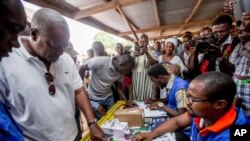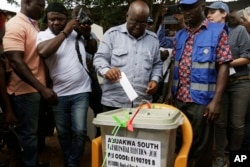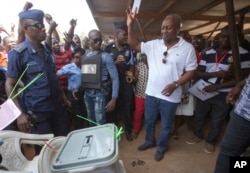Voters in Ghana went to the polls Wednesday as the West African nation held elections for a new parliament and president.
The presidential race is seen as a close contest between incumbent John Mahma and opposition leader Nana Akufo-Addo, who is making a third attempt at the presidency.
Voting in the capital, Accra, proceeded peacefully, but slowly as people waited in long lines for their turn to vote. Some people spent the night at their respective polling stations in order to cast their ballot early.
A voter in the Ayawaso constituency, Evans Boakye, took the opposite approach.
“I am here to exercise my franchise, to vote," he said. "I got here like five minutes ago. I just decided to come in the afternoon because I know the queue would have gone down."
Charles Ayambire was happy to have successfully voted.
“Yeah I have voted," he said. "Oh, it went well. At the morning it was busy, but as at now the queue is going slowly but it is going on. I came here, that was 8 o’clock.
Asked who he voted for, Ayambire said, "Oh, that one is my secret."
But not everyone was happy. A woman was prevented from voting because her name was not in the register.
“I am having a problem right now," she said. "I have not sorted it out right now. I cannot find my name. The card I have is the same card I voted with, but they said this is the old one so I want to verify. They said maybe it could be a spelling mistake so I am trying to check with them.”
President Mahama, candidate for the ruling NDC party, voted in his hometown of Bole in the north and told Ghanaians he had done his best.
His rival, Nana Akufo-Addo, leader of the main opposition NPP, cast his ballot in his hometown of Kyebi in the east.
Although voting started late in some places, due to the late arrival of voting materials, the electoral commission says the exercise has been smooth.
Local and international observer groups, as well as the U.S. Ambassador to Ghana, Robert Jackson, have commended the election process so far.
This is the seventh time Ghana has held national elections since becoming a constitutional, multi-party democracy in 1992.
The nation of 27 million has witnessed several peaceful transfers of power and is considered one of the most stable countries Africa.






